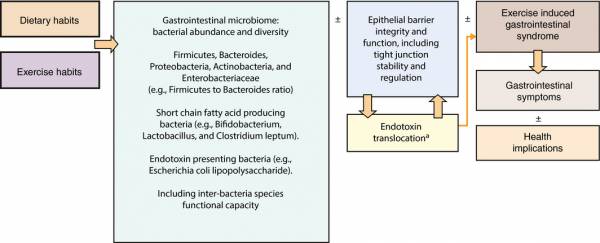We’ve all heard the saying, “Too much of a good thing can be bad for you.” Yes, that includes exercise.
Studies in the past have indicated that excessive amounts of exercise can lead to a broad range of problems. Rhabdomyolysis, for example, can be caused by extreme muscle strain, even among elite athletes. Arthritis can be the result of excessive wear and tear on the joints, along with other injuries like repetitive muscle injuries and bursitis.
Now, it turns out your gut is the next victim of excessive exercise. A review published in Alimentary Pharmacology & Therapeutics found that people who exercise to an excess have a higher risk of gut issues, both chronic and acute.
According to the review, the term excess defines exercise that lasts for more than 120 minutes at 60% VO2 Max. Even though it’s not high-intensity exercise, the duration is the problem. Sustaining that degree of exertion for two hours can lead to some very negative changes to the gut bacteria.
Excessive exercise led to injuries to the intestinal cells, leading to intestinal permeability or a leaky gut. This refers to what happens when the cells lining the intestinal walls allow larger particles to pass through into the bloodstream, including potentially dangerous and toxic substances. Pathogenic endotoxins that are normally isolated within the intestines enter the bloodstream. This can lead to health complications, both chronic and acute.

The intestinal microbiome and exercise-induced gastrointestinal syndrome: a speculative model.
To make things worse, exercise for longer periods in hot environments can exacerbate the problem. And it’s not just limited to fitness newbies. The intestinal results of excessive exercise were the same, irrespective of the fitness level of the various people evaluated.
Bonus: On the flip side, the review found that exercise (not excessive, but normal amounts) can help to improve the conditions of inflammatory bowel disease and irritable bowel syndrome. Low to moderate-intensity physical activity can provide benefits, including a decrease in gut dysfunction.
Among some of the suggestions from the researchers on prevention strategies were these nuggets:
- There is evidence that dehydration may exacerbate exercise-associated gastrointestinal disturbances. The suggestion is that you don’t over-hydrate and you don’t end up getting dehydrated. Both have an effect on your gut. Euhydration, the absence of absolute or relative hydration or dehydration, is the ideal state.
- Eat carbs. Frequent and consistent consumption of carbohydrate during exercise is a protective strategy against exercise-induced gastrointestinal perturbations.
- Avoid NSAIDs. Things like Ibuprofen. The administration of NSAIDs prior to exercise can markedly increase intestinal injury and permeability in response to exercise, so avoidance of NSAIDs prior to exercise would be recommended to minimize exercise-associated gastrointestinal damage.
“Despite excessive exercise being confirmed to compromise gut integrity and function, we have identified several exacerbating factors which can be controlled, and several prevention and management strategies that can attenuate and abolish the damage and compromised function,” said Dr. Ricardo Costa, lead author of the Alimentary Pharmacology & Therapeutics review. “It is recommended that a full gut assessment during exercise should be undertaken by individuals with symptoms of gut disturbances during exercise, to ascertain what is causing the issue and to develop individually tailored management strategies.”
Reference:
1. R. J. S. Costa, R. M. J. Snipe, C. M. Kitic, P. R. Gibson. “Systematic review: exercise-induced gastrointestinal syndrome-implications for health and intestinal disease.” Alimentary Pharmacology & Therapeutics, 2017.






